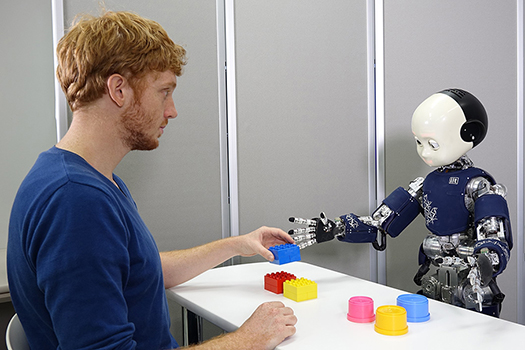
Yukie Nagai, Ph.D.
Principal Investigator
Computation
Project Professor
Understanding and assisting human intelligence through cognitive developmental robotics
Research
Human infants acquire diverse cognitive functions within the first few years of life. Although the dynamics of cognitive development have been increasingly analyzed, the underlying neural mechanisms are still not fully understood. We aim to clarify these mechanisms from a constructive perspective based on the embodied predictive processing theory, which extends general principles of brain function. Predictive processing is a framework in which internal models are updated and actions are generated to minimize prediction errors—the differences between bottom-up sensory inputs and top-down predictions. By incorporating embodiment into this framework, we explore how not only brain refinement but also sensorimotor development and social interaction influence cognition. We implement neural network models grounded in this theory into robots and allow them to learn from varied sensorimotor experiences to examine how and to what extent developmental continuity and diversity can be accounted for. The findings are further applied to assistive technologies for individuals with developmental disorders, aiming to promote self-understanding and support the design of an inclusive society.

Publications
Aude Billard, Alin Albu-Schaeffer, Michael Beetz, Wolfram Burgard, Peter Corke, Matei Ciocarlie, Ravinder Dahiya, Danica Kragic, Ken Goldberg, Yukie Nagai, and Davide Scaramuzza, “A roadmap for AI in robotics,” Nature Machine Intelligence, 7:818-824, June 2025.
Tsujita, M., Homma, M., Kumagaya, S., and Nagai, Y. Comprehensive intervention for reducing stigma of autism spectrum disorders: Incorporating the experience of simulated autistic perception and social contact. PLoS ONE, 18(8):e0288586, 2023.
Philippsen, A., Tsuji, S., and Nagai, Y. Quantifying developmental and individual differences in spontaneous drawing completion among children. Frontiers in Psychology, 13:783446, 2022.
Philippsen, A., Tsuji, S., and Nagai, Y. Simulating Developmental and Individual Differences of Drawing Behavior in Children Using a Predictive Coding Model. Frontiers in Neurorobotics, 16:856184, 2022.
Seker, M. Y., Ahmetoglu, A., Nagai, Y., Asada, M., Oztop, E., and Ugur, E. Imitation and mirror systems in robots through Deep Modality Blending Networks. Neural Networks, 146:22-35, 2022.
Friston, K., Moran, R. J., Nagai, Y., Taniguchi, T., Gomi, H., and Tenenbaum, J. World model learning and inference. Neural Networks, 144:573-590, 2021.
Lanillos, P., Oliva, D., Philippsen, A., Yamashita, Y., Nagai, Y., and Cheng, G. A review on neural network models of schizophrenia and autism spectrum disorder. Neural Networks, 122:338-363, 2020.
Nagai, Y. Predictive learning: its key role in early cognitive development. Philosophical Transactions of the Royal Society B: Biological Sciences, 374(1771):20180030, 2019.
Horii, T., Nagai, Y., and Asada, M. Modeling Development of Multimodal Emotion Perception Guided by Tactile Dominance and Perceptual Improvement. IEEE Transactions on Cognitive and Developmental Systems, 10(3):762-775, 2018.
Baraglia, J., Nagai, Y., and Asada, M. Emergence of Altruistic Behavior Through the Minimization of Prediction Error. IEEE Transactions on Cognitive and Developmental Systems, 8(3):141-151, 2016.
Biography
Yukie Nagai received her Ph.D. in Engineering from Osaka University in 2004. Following her doctoral studies, she held research positions at the National Institute of Information and Communications Technology, Bielefeld University, and Osaka University. Since 2019, she has served as a Project Professor at the International Research Center for Neurointelligence (IRCN) at the University of Tokyo, where she leads the Cognitive Developmental Robotics Laboratory. Her research explores the developmental mechanisms of human social cognition through computational approaches. In recognition of her contributions, she was selected as one of the Analytics Insight “World’s 50 Most Renowned Women in Robotics” in 2020, one of the IEEE IROS “35 Women in Robotics Engineering and Science” in 2022, one of the Forbes JAPAN “Women In Tech 30”, among other honors. She is also the principal investigator of two JST CREST projects: “Cognitive Mirroring” since 2016 and “Cognitive Feeling” since 2021. Her concurrent roles include Project Professor at both the Next Generation Artificial Intelligence Research Center and the Center for Coproduction of Inclusion, Diversity, and Equity at the University of Tokyo; Visiting Professor at the Center for Human Nature, Artificial Intelligence, and Neuroscience at Hokkaido University; and Associate Member of the Science Council of Japan.


